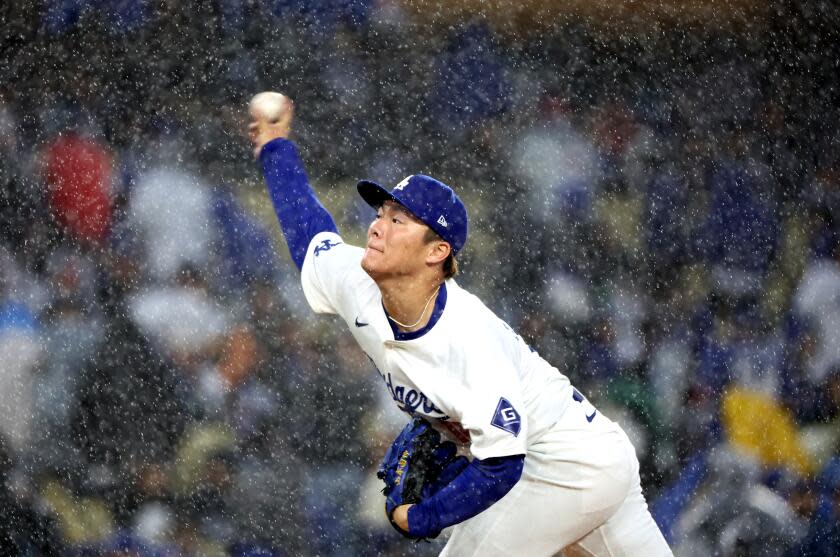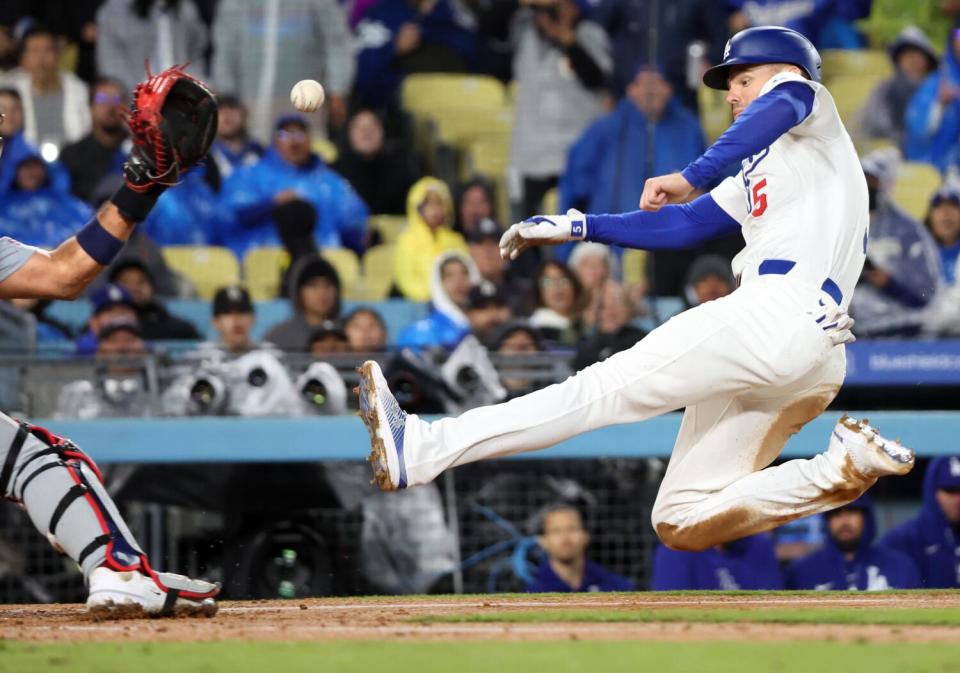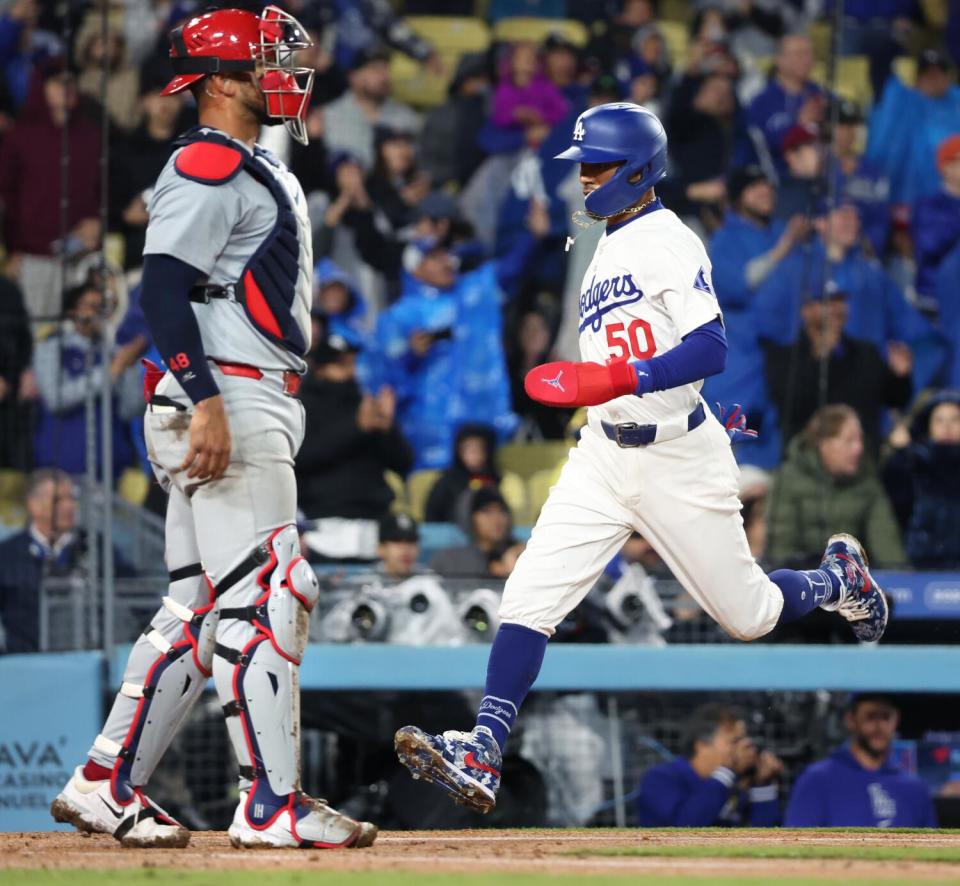The Dodgers alleviated one big roster question Saturday night.
But, in a 6-5 extra-innings loss to the St. Louis Cardinals, another personnel concern quickly surfaced in its place.
The good news for the team: Yoshinobu Yamamoto rebounded from his disastrous debut in South Korea, spinning five shutout innings in his first career start at Dodger Stadium.
Mookie Betts also maintained his blistering pace in the early season, helping the Dodgers erase a late three-run deficit with three hits, including a ninth-inning homer, before the team ultimately left the bases loaded in the 10th inning to end the game.
The bad news for the club: Its biggest bullpen weakness — a lack of reliable options to deploy against left-handed hitters — blew up in its face during a seventh-inning collapse.
Read more: Teoscar Hernández is trying to revive his career in L.A. So far, it’s working
Leading by two runs entering the top of the seventh, right-hander Joe Kelly was summoned to face not only the middle of the Cardinals’ underwhelming lineup, but the string of left-handed bats lurking at the bottom of it.
Kelly did himself no favors by walking the leadoff batter and then plunking the next. Catcher Will Smith worsened the jam moments later, committing a catcher’s interference infraction to load the bases.
After a sacrifice fly by Iván Herrera cut the Dodgers’ lead in half, Roberts faced his first big decision of the season.
Leave Kelly in for the four straight left-handed Cardinals hitters due up next (lefties batted just .197 against Kelly last year but posted a troubling .748 OPS)?
Or turn to the one lefty specialist in his bullpen, Alex Vesia (who followed up a down 2023 performance with more inconsistency this spring)?
Roberts chose the former.
“A guy like Joe Kelly,” Roberts said, “it really shouldn’t, doesn’t matter when he pitches.”
Only this time, it did, with Kelly’s sloppy seventh looming as the biggest factor in a preventable defeat.
The first left-hander, Alec Burleson, hammered an elevated fastball to right that tied the score.
The next, Brandon Crawford, singled to load the bases again.
Then, in a briefly confounding sequence that gave the Cardinals the lead, Victor Scott II hit a seemingly routine lineout to left — only for third base umpire Ryan Blakney to call Kelly for a balk that negated the out, and forced the go-ahead run across the plate.
“It was a balk,” Roberts said. “He didn’t stop. Ryan Blakney got it right.”
Yet, only once the Cardinals stretched the lead to 5-2 on a two-run double from Brendan Donovan — the fourth left-handed hitter in a row to come to the plate against Kelly — did Roberts finally turn to Vesia, who ended the threat without further damage.
As Kelly exited the field, not even his Mariachi-fueled popularity left him immune from boos, with a crowd of 45,019 expressing its frustration on a night that had already included a rare 35-minute rain delay — believed to be the first at Dodger Stadium since 2015.
However, the real ire might be better directed at the team’s decision-makers; not only Roberts, but a culpable front office that traded away productive (albeit, hardly unhittable) left-handed relievers Caleb Ferguson and Victor González this offseason without adding any direct replacements.
“He’s a neutral guy, he’s a high-leverage guy for us,” Roberts said of Kelly, echoing explanations he gave this spring about the Dodgers possessing enough “neutral” right-handed pitchers to compensate for their lack of left-handed depth.
Read more: How the Dodgers are getting to know Shohei Ohtani, even from his baserunning mistake
“Obviously we had Alex looming,” Roberts added. “But still, I felt very comfortable with Joe. And he just didn’t have a good night.”
Despite all that, the Dodgers’ star-studded core almost erased the pain.
Yamamoto’s bounce-back effort was a sigh of relief for the team, which worked with the 25-year-old rookie over the last week on refining his mechanics and improving his command.
“We just honestly want him to get out there and be him,” assistant pitching coach Connor McGuiness said before the game, promising “dramatically improved” form from the $325-million Japanese signing.
“It’s only going to get better from here,” McGuiness added. “That one [in Korea], I think you could simply just chalk it up to being quite honestly a fluke.”
Betts also continued his decidedly un-flukey play — he has now reached base in 18 of his first 25 plate appearances — to help the Dodgers get back in the game.
In the seventh inning, Betts doubled and scored on a Smith single, cutting the deficit to 5-3.
In the ninth, Betts whacked his fourth home run of the season to trim the Cardinals’ lead to one, before Freddie Freeman, Smith and Max Muncy tied the score with three straight singles.
On defense, Betts also turned several tricky plays at his new shortstop position, paying off hours of pregame work on his backhand by converting several outs on grounders hit to his right.
“I’m very proud of myself for making those plays and all the work,” Betts said. “But we’ve got to win ballgames.”
Indeed, despite Yamamoto’s improvement and Betts’ heroics, the Dodgers couldn’t complete the rally.
The Cardinals scored their automatic runner in the 10th, taking a 6-5 lead.
The Dodgers stranded the bases loaded in the bottom of the inning, which ended on a routine pop-up from Shohei Ohtani, who said after the game he is feeling a little off with his timing and swing mechanics amid a six for 22 start that has included just one extra-base hit.
For the first time on home soil this year, the Dodgers were reminded that even $1.4 billion of offseason spending has its limitations.
Betts, Ohtani, Freeman, Yamamoto and opening day starter Tyler Glasnow can compensate for a lot with their raw talent.
But Saturday served as a reminder that the Dodgers still have holes that can potentially cost them games.
Sign up for more Dodgers news with Dodgers Dugout. Delivered at the start of each series.
This story originally appeared in Los Angeles Times.


